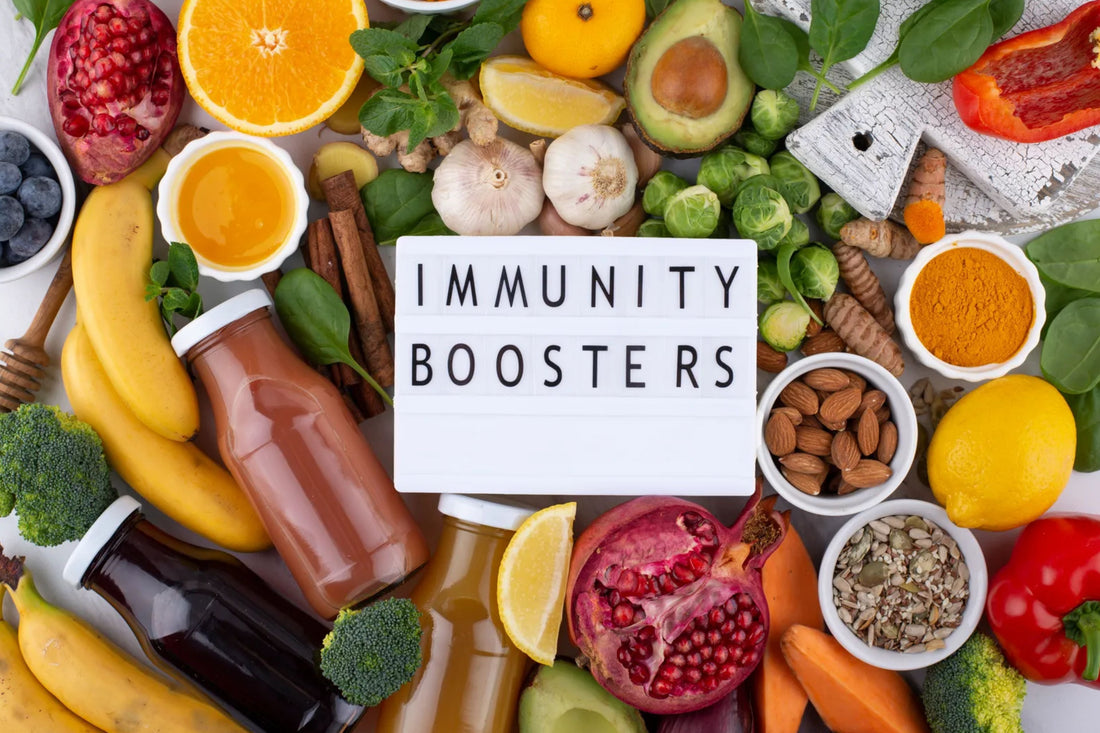
Immune-Boosting Foods vs. Supplements: What Works Best?
Share
In a world where staying healthy is more important than ever, many people are asking:
“Should I eat immune-boosting foods or take supplements?”
The answer isn't one-size-fits-all. While both options support your immune system, the way they work, their effectiveness, and their risks can vary.
In this post, we’ll break down the pros and cons of immune-boosting foods vs. supplements, and help you figure out what’s best for your health. 🧠💪
🧬 Why Immune Health Matters
Your immune system is your body's natural defense against illness, infections, and disease. Keeping it strong helps:
- Fight off viruses and bacteria 🦠
- Speed up recovery time ⏱️
- Reduce the risk of chronic illness ⚠️
- Improve overall well-being 🌟
Let’s explore how both natural foods and supplements can give your immune system the support it needs.
🥗 Immune-Boosting Foods: The Natural Way
Nature gives us powerful nutrients through whole foods—rich in vitamins, minerals, and antioxidants that work synergistically in the body.
✅ Benefits of Immune-Boosting Foods:
- Nutrients are better absorbed when consumed in whole food form 🍽️
- Provides fiber, antioxidants, and phytonutrients not found in pills 🌿
- Reduces reliance on synthetic additives or fillers ❌
🥑 Top Immune-Boosting Foods:
- 🍊 Citrus fruits (Vitamin C)
- 🥦 Broccoli (Vitamin A, C, E)
- 🧄 Garlic (Antimicrobial properties)
- 🍓 Berries (Antioxidants like flavonoids)
- 🐟 Fatty fish (Omega-3s and Vitamin D)
- 🫐 Mushrooms (Beta-glucans and selenium)
- 🌰 Nuts and seeds (Zinc and Vitamin E)
Pro Tip: Eat a rainbow of fruits and veggies every day for full immune support 🌈
💊 Supplements: A Convenient Boost
When your diet falls short or your lifestyle demands more, supplements can help fill the gaps. They’re fast, easy, and often recommended for people with deficiencies.
✅ Benefits of Immune Supplements:
- Convenient and easy to take daily ✅
- Great for people with dietary restrictions 🥗
- Targeted support for known deficiencies (like Vitamin D) 🌞
💊 Common Immune-Boosting Supplements:
- Vitamin C – antioxidant and immune support 🍋
- Vitamin D – essential for immune regulation 🌤️
- Zinc – helps fight viruses and bacteria 🛡️
- Elderberry – antiviral and antioxidant-rich 🌸
- Probiotics – supports gut health, which affects immunity 🦠
Important: Always choose high-quality, third-party tested supplements and follow dosage guidelines.
⚖️ Foods vs. Supplements: Which Is Better?
🏆 Our Verdict:
Whole foods should be your foundation for immune health.
Supplements are best used to support or correct nutritional gaps—not replace a balanced diet.
💡 When You Might Need Supplements:
- You have a diagnosed deficiency (e.g. Vitamin D or B12)
- You follow a restricted diet (e.g. vegan, keto)
- You’re over 50, pregnant, or breastfeeding
- You live in a low-sunlight region ☁️
- You’re under stress or recovering from illness
Talk to a healthcare professional before starting any new supplement regimen. 👩⚕️👨⚕️
🛒 Bonus Tip: What to Look for in Quality Supplements
- ✅ NSF or USP-certified
- ✅ Free from fillers or synthetic dyes
- ✅ Clinically-backed ingredients
- ✅ Transparent labeling
🔚 Final Thoughts: Balance Is Key 🧘
When it comes to immune support, food is your first and most powerful medicine. Supplements can help—but they should complement, not replace, a nutrient-rich diet.
👩🍳 Eat whole, colorful foods
💊 Supplement wisely
💧 Stay hydrated
😴 Sleep well
🏃 Move daily
The best immune support comes from a healthy, balanced lifestyle.
![HBS+ [ Human Being Sports ]](http://humanbeingsports.com/cdn/shop/files/logo.png?v=1747052408&width=600)

